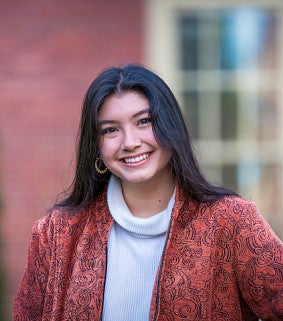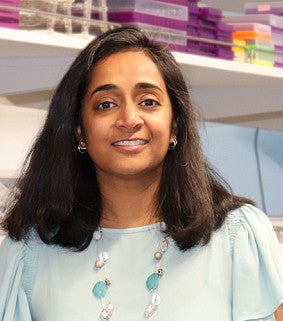
Story by Ella Norton, CHC Communications
Photo by Jasper Zhou, CHC Communications
Clark Honors College first-year student Dante' James pours Celsius from a can into a vial during her lab as her professor, Dr. Nadia Singh, watches her progress. She’s examining how the energy drink consumption affects the microbiomes of fruit flies as part of her research for Students of Color Opportunities in Research Enrichment, otherwise known as SCORE. SCORE is a one-year program for students who identify as part of an underrepresented community that is introduced to research opportunities.
“SCORE encompasses a variety of training on basic lab procedures, like how to read a research article, extract, DNA, swab plates and more in the hopes of giving students of colors more opportunities and experiences,” James said. “There is a disparity between students of color and research, so SCORE tries to reduce this gap by teaching us early on and through endorsing a sense of belonging.”
SCORE was started several years ago by a graduate student as a club but is now taught as a one- credit course by associate biology professor Singh.
“I think any infrastructure that we can provide to diversify the workforce, especially the scientific workforce, is really important,” Singh said. “Every step of the way there are barriers, and we need different kinds of interventions at every step to make sure we are not losing our women and people of color.”
When SCORE began, it only had a few members, but the program has now grown to 13 students. Because of its rising numbers, members from last year’s cohort returned to peer mentor this year’s cohort, including sophomore Audrey Saing.
“I think for me, I’ve always had a passion for learning but over the years I’ve realized that I want to apply my learning beyond the classroom,” Saing said. “I’ve always really valued scientific research, and it’s really nice to be able to contribute to the research community so that future students are able to expand upon that knowledge and help create changes in the world.”
SCORE still follows the same model from when it began; in the fall term, students learn professional development, conduct research projects during winter term and analyze and present the data at the Undergraduate Research Symposium during the spring term. However, Singh believes the most important thing students gain from the program is self-efficacy.

“Students routinely say they come into the class not sure they could be a scientist and leave knowing they can,” she said. “It’s not really about lab skills or reading a paper, it’s about developing agency and a sense of identity and connecting with themselves as a scientist.”
John Francis, who graduated from the CHC in Spring 2021 and is now at Case Western Reserve University School of Medicine pursuing his M.D., also agrees that one of the most beneficial skills he got from SCORE is the interpersonal skills.
“I think that [SCORE helped me] by giving me a technical skill set and providing me with the softer skills that people don’t talk about, like etiquette while working in a lab, etiquette while working in academia . . . it has really benefited me now,” Francis said.
James also thinks that this class has increased her confidence in the lab and given her a community support system.
“I think people are very hesitant to be open about what they like,” James said. “Once you realize that people are there to help you, and are genuinely interested in your passions and curiosities, it makes it so much easier to connect you to further research and opportunities. Also, building a strong support system of friends and mentors is great.”
Along with the support system they gained, both James and Saing spoke about how important of a mentor Singh is to them.
“Nadia Singh, she’s really inspirational,” Saing said. “She’s shared her own story, her own research background, her undergraduate experience and the ups and downs of that, and how she’s accomplished so much in terms of research and advocating for students of color. It helped me settle my own worries about research.”
Going forward, Dr. Singh said she would love to see the program continue to expand.
“There is a huge wealth of data indicating that exposure to research early bolsters perseverance in some disciplines and this is particularly true for students of underrepresented groups,” Dr. Singh said. “Between the community and the research exposure, my hope is that we can increase the persistence in STEM for students from underrepresented groups.”
